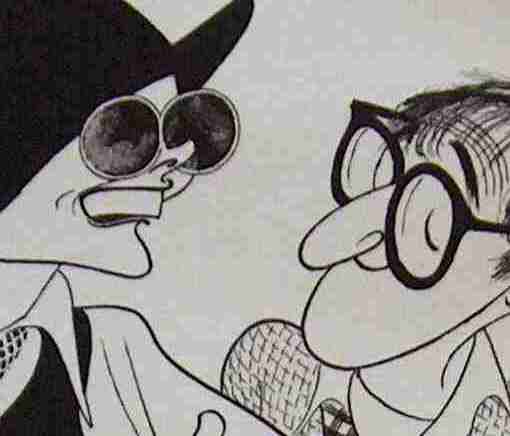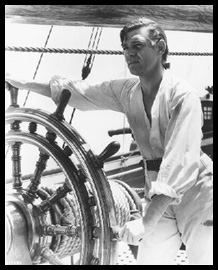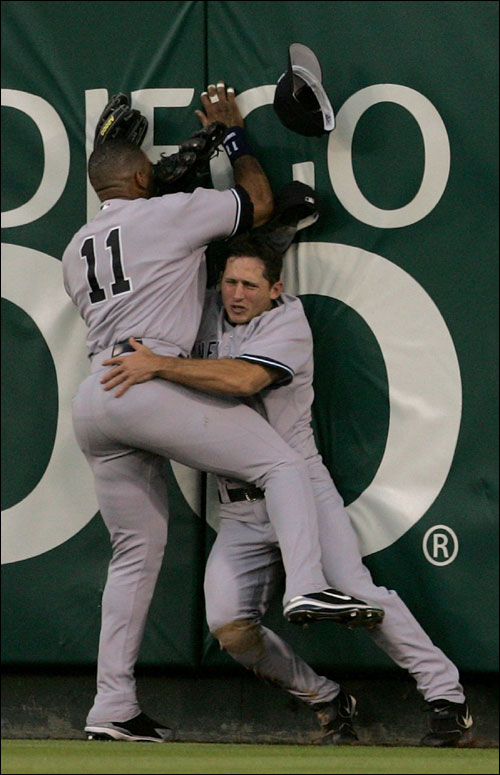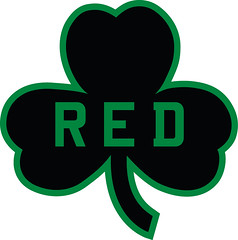 In honor of Erick Dampier's vintage performance tonight against the Suns (four minutes, two points, and three personal fouls through halftime) Faster Than A Shark presents a full length feature on Dampier. It is in fact a paper I wrote at the end of last year, just before the NBA Finals. I was trying to make up a sportswriting class I'd failed in the fall. Of course, I didn't pass the class, but, enjoy.
In honor of Erick Dampier's vintage performance tonight against the Suns (four minutes, two points, and three personal fouls through halftime) Faster Than A Shark presents a full length feature on Dampier. It is in fact a paper I wrote at the end of last year, just before the NBA Finals. I was trying to make up a sportswriting class I'd failed in the fall. Of course, I didn't pass the class, but, enjoy.
[Note that I actually provided sources since it was for a class. They were preserved when copied onto this.] Erick Dampier grew to 6-11 and 235 pounds and went to Mississippi State to play basketball. He took his team to the Sweet Sixteen in 1995, and then, in his junior season, he helped his fifth seeded school to the Final Four and declared for the draft. But it was when he strode across the stage, selected tenth overall by the Indiana Pacers ahead of future stars Kobe Bryant, Steve Nash, and Jermaine O’Neal, that the story of Erick Dampier really began. Towering over NBA commissioner David Stern, he appeared in white checkered dress pants, a carefully kept goatee, and red blazer that refined the term unfortunate[i]. It was a disastrous fashion choice that would later come to symbolize his career: in the NBA, Erick Dampier would stand out for all the wrong reasons.

As a center due to his tremendous size, Dampier plays arguably the most important position on the court; the center stands close to the basket (often called ‘playing the post’), and is expected to receive passes and score on high percentage lay-ups and dunks. A skilled center should also be a dominant rebounder and shot blocker. Due to the combination of size and skill required to excel as an NBA center, there are at any time only a very few number of stars at the position in the league. The impact of a stellar center on his team is incredible, as shown in the championships and accolades attained by such players as Wilt Chamberlain, Bill Russell, Kareem Abdul-Jabbar, Patrick Ewing, and Shaquille O’Neal. Throughout his career, Dampier has never been one of the five or so best in the league, but he has always been close, just good enough to put in a good performance against a lowly sub-par team but never at the level of the big boys. It has made for a frustrating career.
While the center is the largest and most imposing player on his team, in practice this can mean that he is also the slowest and most immobile. A poor center, for all his size, can be little better than a target for smaller, more talented players to dunk over. As the primary shot blocker, the center is also the team’s quickest accumulator of fouls, nipping the arms of driving guards and often having to sit for long stretches to avoid fouling out. Small, flashy guards are fan favorites; centers are often noticed more for their shortcomings[ii] (bobbled rebounds, foul trouble) than their contributions (boxing out, screens), and can, with their huge size, become scapegoats and targets of a frustrated fan base. While these points are true of even the best at the position, Dampier has been accused of them and defined by them his entire career.
Dampier was traded early in his career from the Indiana Pacers to the Golden State Warriors, a team that has famously missed the playoffs every year since its early nineties firesale. He put up a respectable 11.8 points per game (ppg) and 8.7 rebounds per game (rpg) for a terrible 1998 team that finished at 19-63[iii], but regressed from that production in his next five years for the club, which never posted a winning record. In 2004, his contract year Dampier was much improved, playing with a new intensity and averaging 12.3 points and 12 rebounds. Although there was skepticism about his effort rising with his chance to leave Golden State, Dampier was beginning to be regarded as part of the inner circle, one of the top two or three centers in the league[iv]. Dampier actually described himself as the number two center in the NBA, second only the O’Neal[v]. Regarded as an emerging star, it was time for Dampier to leave the hopeless Warriors and seek a free agent contract with a more successful team.
That summer, Mark Cuban, eccentric billionaire owner of the Dallas Mavericks, a team plagued for years by the lack of even an average center[vi], produced a seven-year, $73 million dollar contract offer as part of a sign and trade. The Mavericks boasted one of the league’s best, improving players in Dirk Nowitzki and a talented collection of supporting players, and were seemingly only one All-Star center away from Finals contention. Unfortunately, just as he had in Golden State, Dampier arrived to break up a successful combination. Dallas had a free agent of its own that summer but decided to sign Dampier instead of resigning point guard Steve Nash, the wild-haired Canadian All-Star and local favorite, who went to rival Phoenix. While Dampier’s statistics regressed to pre-2004 levels, Nash was famously revitalized in the desert, winning the league MVP Award.
The Mavericks drew the Houston Rockets and then Nash’s Phoenix Suns in the playoffs. Dampier’s comment from a year earlier that he was the second best center in the league was proved ridiculous by his sluggish play against Houston’s Yao Ming and Phoenix’s Amare Stoudemire, but when confronted he maintained, “I said last year I was the second-best, and I stick by what I said. Nothing’s changed.[vii]” The Nash-for-Dampier swap was showcased on a national stage when the two teams faced off in the second round. Nash averaged 30.3 points, 12 assists, and an astonishing 6.5 rebounds; Dampier, 7 points and 7.5 rebounds. It was the culmination of a season of frustration and national ridicule for Dallas fans.
Though the team had also underperformed in other areas, massive media and fan criticism surrounded Dampier going into the 2005-2006 season. He was called out on court by Nowitzki for his poor play and his signing was widely regarded as a disaster. Bill Walton compared him to Shawn Bradley, the awful center he replaced.[viii] Shaquille O’Neal called him “soft[ix]”. A 2006 preview said of the center, “The megadeal Dampier was egregiously given will go down as the final fiscal atrocity that killed the Mavericks. He's slow and predictable at both ends, and barely serves a purpose for this team.[x]” Richie Whitt of the Dallas Observer summed up Dampier’s first season as a Maverick with the following:
But mostly Dampier was, a slow-footed, sloppy-handed big man who fouled too much and contributed too little on a team knocked out of the playoffs by Nash and the Suns in the second round. He missed 21 games with a stress fracture in his foot. Shot only 60 percent from the free-throw line. Turned assists into turnovers with mishandles near the hoop. And, in a paltry post-season, he was shut down by the Rockets' Yao and called out by teammate Dirk Nowitzki after being outscored an embarrassing 40-0 by the Suns' Stoudemire in Game 1. [xi]
Probably as a result of his infamous ‘second best’ comment, Dampier continued to take a beating in the press from Shaquille O’Neal, who is not only the best center of his generation but one of the most media-friendly players. Once when coming off injury he said that he “played like Erick Dampier”[xii], and has also noted that Erick, or “Erica[xiii]”, would be a dominant center in the WNBA. Jabs like this echoed around the country as Dampier, with increased television exposure, uninspired play, and a monstrous contract became a national punch line and a player regarded as one of the worst signings in recent times, in the unwanted company of the likes of Chan Ho Park and Albert Belle.
The 2006 season would prove another ugly one for the much maligned center. Despite his salary (Dampier made $8,662,500 this year[xiv]), Erick lost his starting role and was replaced by the younger, taller DeSagana Diop, despite Diop’s utter lack of an offensive game. Dampier appeared in interviews to be indifferent to the demotion, prompting scathing articles from the Dallas media questioning his competitiveness, bringing up all the issues yet again: his poor play, giant contract, and replacement of the popular and energetic Steve Nash, who won a second MVP Award.
Dampier turned in a good performance against Memphis, a team without even the semblance of a quality center[xv], in the first round of the playoffs, but by the middle of the second round had been replaced by Diop again. Bill Walton referred to Diop as the “unsung hero” of the deciding Game Seven against the Spurs for his excellent defense against Tim Duncan and crucial offensive rebounding after coming in for Dampier. The franchise’s $73 million man watched the end of the most important game in Mavericks history from the bench. Matched up against Nash’s Suns again with a trip to the Finals on the line, Dampier played only 24 minutes and got into only two games in a series the Mavericks won 4-2. Once again $73 million sat on the bench as the clock wound down.
Watching Dampier play it is easy to see his flaws, but just as easy to see the toll years of criticism have wreaked on the once-promising young man out of Mississippi State. None of his movements are graceful, and the weight of expectation is almost tangible. Every play, from box out to bobbled pass to awkward shot attempt, is a referendum on his contract, competitiveness, and worthiness. Every little failure, a dropped pass, missed throw, or unfortunate foul, is magnified by the howling fans and historical record. When Dampier trudges back to the bench after picking up a third or fourth foul, it is possible to imagine him wading through the piles of criticism he’s received. A quick pan to him sitting on the bench reveals a glazed, faraway stare. He has deep, sunken eyes and always wears a serious, almost hurt expression. Even his nickname, “Damp” is underwhelming at best. What a disaster.
[i] http://sportsillustrated.cnn.com/multimedia/photo_gallery/2005/06/23/gallery.nbafashion/content.4.html
[ii]http://www.dallasnews.com/sharedcontent/dws/spt/basketball/mavs/stories/120605dnspomavslede.7a720dc.html
[iii] All stats from www.basketballreference.com
[iv] http://www.adonalfoyle.com/GAME_3.shtml
[v] http://www.dallasobserver.com/Issues/2005-11-03/news/whitt.html
[vi] http://deseretnews.com/photos/2212264.jpg
[vii] http://www.dallasobserver.com/Issues/2005-11-03/news/whitt.html
[viii] http://www.signonsandiego.com/uniontrib/20051220/news_lz1s20galry.html
[ix]http://p073.ezboard.com/fdallasbasketballdotcomfrm6.showMessageRange?topicID=167.topic&start=21&stop=40
[x] http://probasketball.about.com/od/teams/a/mavericks06.htm
[xi] http://www.dallasobserver.com/Issues/2005-11-03/news/whitt.html
[xii] http://www.dallasobserver.com/Issues/2005-11-03/news/whitt.html
[xiii] http://en.wikipedia.org/wiki/Erick_Dampier
[xiv] http://www.basketball-reference.com/players/d/dampier01.html
[xv] http://www.commercialappeal.com/mca/sports_columnists/article/0,1426,MCA_468_4645993,00.html













